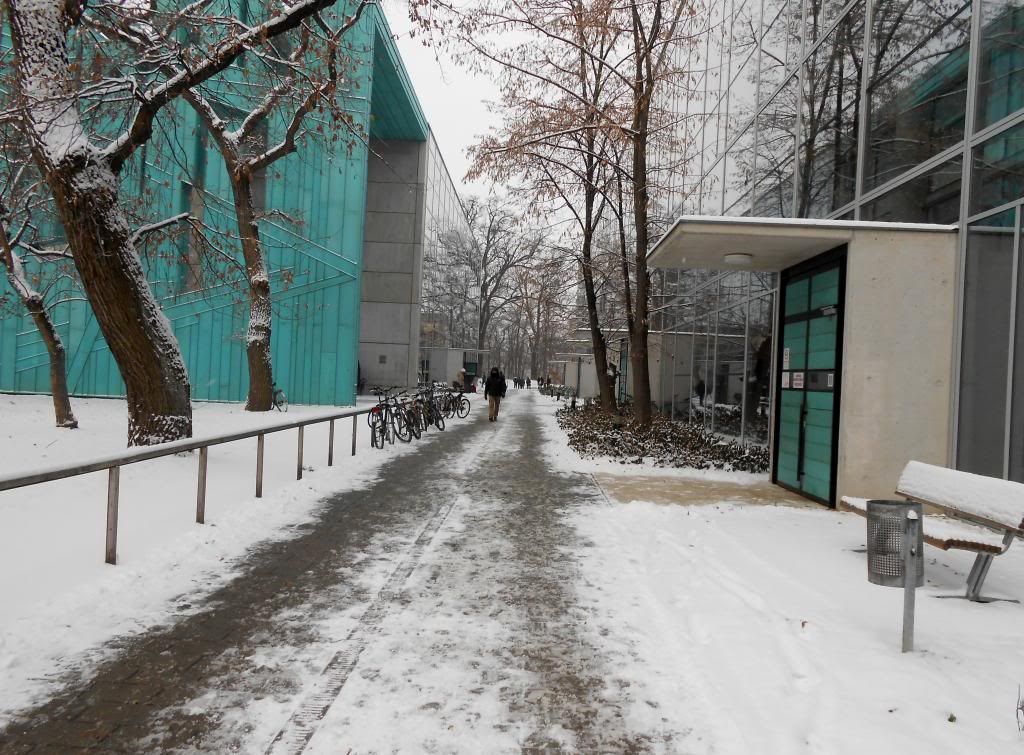I just got home from the physiology lab exam. I passed. There were so many parameters and values to memorize... would drive anyone crazy... but it worked... oh and as for the biochem exam yesterday, I think it went OK? By OK I mean it could have been worse, after all it was quite hard... I need 26/32 points to get the highest grade... I'm not sure that was accomplished... but I'll have a grade 4 for sure. What's up next... physiology exam tomorrow and Hungarian on Friday. Histology and anatomy in the coming week. Hungarian... always at the wrong time... but what to do... for now I'm off to the shower, then the bed... and then there's going to be a looong night O.O
Life science building (today). Mostly medicine and dentistry students stroll around here but there's also engineering and arts...

Hi there, congratulations to you on passing the Physio lab exam. I just wanted to know that what did you study for the Physiology closing lab exam? and also what is your method and your studying sources for Biochemistry? I'm asking you because you've got a good grade in Biochem which I think is a hard thing to achieve. it would be very appreciated if you write about these maybe in your next post or in the comment section. Thanks, I really need some clues on how to study these subjects.
ReplyDeleteHellu! Thanks :D for the lab exam my #1 advice is to go all in for the physical parameters, it would be so stupid to fail just because you don't know one of the parameters they ask you in the beginning. Some examinors were fine with the students answering 2/3 correctly but the lady I had demanded 3... also you need to know them for like half of the lab topics anyways, so they're really worh the time. I read the chapters in the practical book until I knew all the procedures :S I don't know if there is a simpler way but that's what I did... make sure you're are able to talk about related theory, like if you get ECG or blood pressure you should be ready to talk about cardiovascular disease. For the computer simulations I memorized the values we used during the labs, like the concentrations applied for acetylcholine etc, because in the exam you won't be given any instructions, at all, only the topic of the lab. There's this one guy (examinor) with gray hair and a pony tail, try to avoid him! He is impatient and insulting, failed a lot of good students... When you're waiting outside the lab they won't call anyone by name. A free examinor will open the door and say neeext student so when you see anyone but that guy, that's when you want to take the exam... haha.
ReplyDeleteHonestly, I only study the lecture slides for biochemistry! I tried some of those "Kaplan" videos for the first self control but I think they are too time consuming. I focus the most on the pathways. You know they will always ask a lot of questions like which of these processes occur in the mitochondrion, which of these molecules is not an intermediate, etc etc. My opinion is that if you really learned the pathway then you will be able to answer all those questions. It's hard to memorize all those pathways, but for me it's helpful to really look at what happens to each molecule in every step. I always compare the molecule before and after, what is the difference, and eventually the names of the enzymes (which are frequently asked) start to make sense and it is much easier to remember each step and the enzyme which catalyses it. Those wall of text lecture slides I skip, the content is usually too detailed to be asked in the test and it's not like we have time to learn excess material... the last thing I do before a test is to go through some old questions with someone else, usually my boyfriend, but it's not a priority to me. I feel like if you know the material you will be able to answer the questions anyways, even if you haven't seen similar questions before.
I hope this was of any help... :P Good luck in the exam!! =)